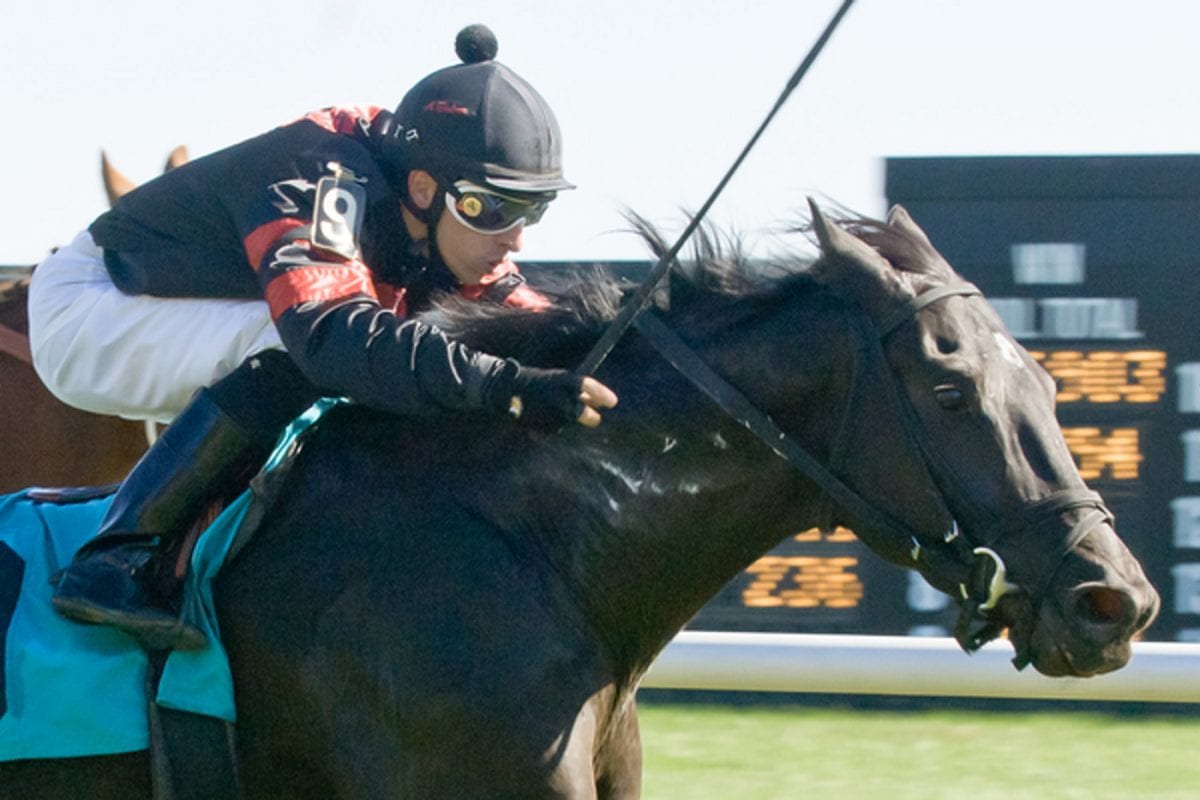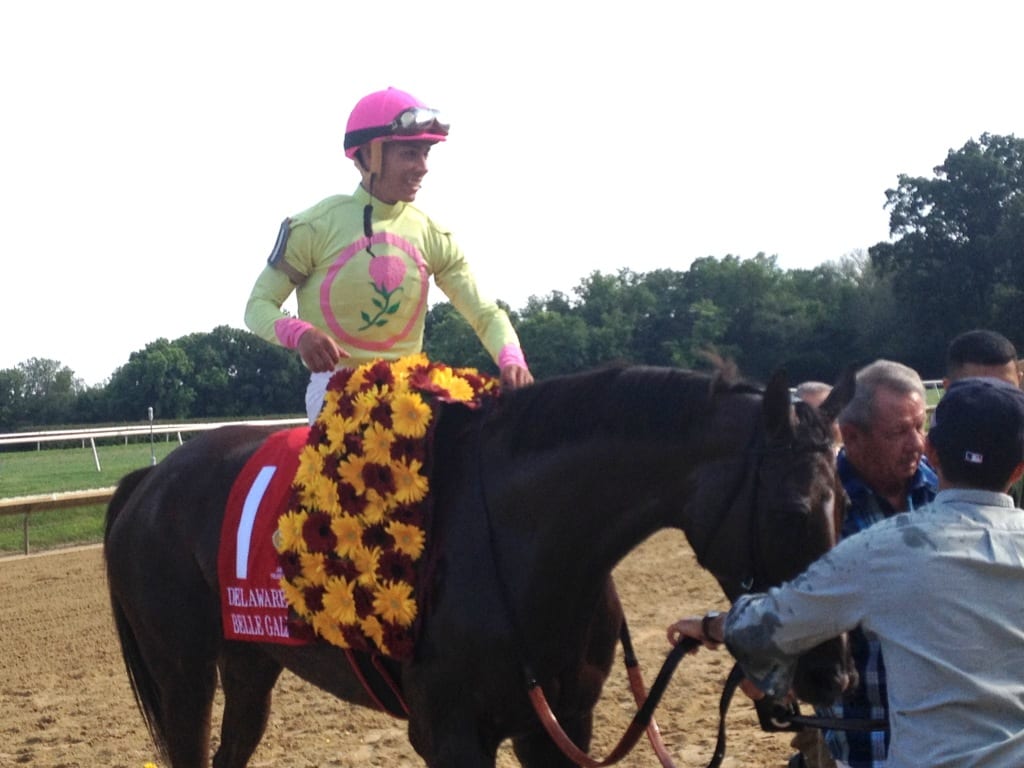by Doug McCoy
The live racing season at Delaware Park came to a close Wednesday. Like an old spaghetti western movie, the meeting was a mix of the good, the bad, and the ugly.
With Maryland racing’s resurgence to prominence and continued competition from Pennsylvania, the racing department faced a tough task putting together racing programs. The racing product, which featured some larger and more competitive fields early in the meeting, unfortunately diminished as time went on and most of the programs were eight-race affairs, usually with an Arabian race. On one occasion races failed to fill for Wednesday, July 30th but in a quirk of fate heavy rains on July 27th washed out part of the racing strip and after cancelling the racing the following day officials were able to move that program to Wednesday.
Final mutuel figures for the meet revealed Delaware Park’s all sources handle dropped 10.7 percent, and track officials point to the fact there were nine percent fewer races run during the 2014 meeting compared to the previous season. The average starters per race of 7.05 was up marginally from the 6.97 figure of 2013, but the bottom line was small fields turn off modern gimmick-happy bettors, and unfortunately for Delaware Park, small fields were the norm rather than the exception.
The meeting’s signature race, the Grade I Delaware Handicap remained the bright spot for the racing program as this year’s winner, Belle Gallantry followed that victory with a decisive winning effort in the Beldame and now could be voted the top older distaffer in the country with a win in the Breeders’ Cup Distaff. Should that happen, it would mark the fourth straight year the DelCap winner went on to earn the Eclipse Award in the filly and mare division.
Beyond the quality of the DelCap, the race, and day, were strong at the windows. In fact, handle on Handicap day card and its week-before counterpart, the Delaware Oaks card, rose 85 percent versus last year.
Few facets of the meeting better demonstrated the good-bad-ugly quality of the meeting than the training race. The race itself was a runaway as controversial conditioner Juan C. Vazquez saddled 49 winners for the meeting, easily outdistancing Scott Lake, who had a comeback season with 31 wins, while Jamie Ness, who captured the title last season with 50 victories, sent out 25 winners while sending out a reduced number of starters (108 to 165) at this year’s meeting.
But meet winner Vazquez made bigger news for something else during the stand. On June 23, he brawled with jockey Trevor McCarthy outside the winner’s circle immediate following a race. That incident got Vazquez arrested and resulted in his receiving a 90-day suspension and $2500 fine by Delaware stewards. That ruling was later upheld by the Delaware Racing Commission, so the leading trainer of the 2014 meeting will not be back to defend his title next season.
The rider’s race came down to the final days of the meeting. Carol Cedeno (50 wins, including Arabian races), Alex Cintron (47), and Daniel Centeno (45) slugged it out to the very end with Cedeno earning her first meet title. But perhaps the bigger story was the emergence of bug rider Fray Martinez, who won 35 races, and Michael Ritvo, who won 31 races in just six weeks, to give Delaware Park two candidates for Eclipse honors as the nation’s top apprentice a year after Victor Carrasco used the Delaware meet as a springboard to a season where he won 210 races and earned Eclipse honors as the top apprentice of 2013.
Another topic of great concern was the performance of LGC Science Labs and the implementation of the new national uniform drug testing policy. Slow turnaround times for test results caused a delay in the payment of purses, and the lab’s general performance record was poor enough for the Delaware Racing Commission to begin steps to terminate its contract with LGC.
What’s more, there has been continuing debate around the Delaware backside regarding implementation of the guidelines set up by the Racing Medication and Testing Consortium. Positive tests involving the muscle relaxant Robaxin and other medications continue even after the Consortium had made adjustments in the recommended time frames for withholding certain medications prior to starting. Local horsemen, who originally supported the idea of a national drug policy, have growing concern the program is not working on a practical level.
“We (the horsemen) were in favor of and supported the idea of a national drug policy. We were eager to show the public that the overwhelming majority of horsemen follow the rules and want those who don’t to be dealt with,” Mike Gorham, president of the Delaware Horsemen’s Association, said recently. “Unfortunately, it just doesn’t seem as if the policy is working on so many levels. There are a number of instances where the theories of the policy are just not supported in practical application, and it has become obvious there is a need for many of the guidelines of the program to be reexamined. It’s not right for horsemen to be the guinea pigs of this venture until those who run the program and set policies get it right.”
Regarding the racing product Gorham said he hopes those who run the local racing program can find a way to attract more stables that fit the type of horses needed to fill races and produce larger fields.
“We have an odd situation here where we have some very good top end races at times, races that have in the past produced horses that have gone on to national prominence, but we can’t seem to attract the stables that will support the program and fill the races on a daily basis,” Gorham pointed out. “I think a vigorous approach by management to attract that type stable would go a long way toward improving the racing product here in the future.”
While Executive Director of Racing John Mooney could not be reached, he did say, in a release, ” We will continue to explore every option to strengthen our racing product in the current environment.”
So Delaware Park concludes its 77th season. There is a contract signed between the track and horsemen for next season, but it would be folly not to admit the long term future of the sport at this historic oval is uncertain. Perhaps the track and horsemen can take steps to improve the chances that racing at this bucolic and historic track can survive in future years for Delaware Park has produced so many memorable figures and unforgettable moments in racing history.
Only time will tell.
(Featured photo by HoofprintsInc.com)










Good summary of the meet. I’m hopeful that new horseman discover how beautiful Delaware Park is and how horse friendly it is. Lots of grass to eat, beautiful horse paths, a turf gallop, etc. etc. I spoke with a couple the other day who frequent the track and have wonderful memories of actually getting dressed up to go to Delaware Park a long time ago.
The lab situation was a big problem, but that should be remedied next year with a new lab.
Thanks for checking in and your comments, Heather.